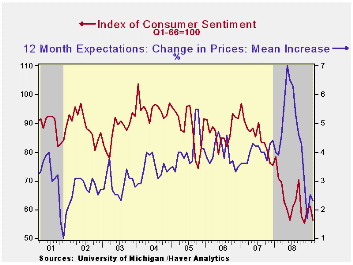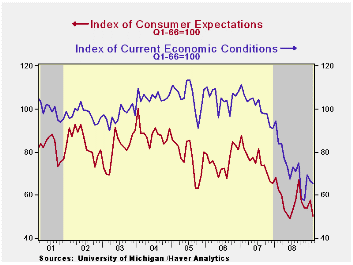 Global| Feb 27 2009
Global| Feb 27 2009Michigan Consumer Sentiment Estimate Little Changed At Lowest Since 1980
by:Tom Moeller
|in:Economy in Brief
Summary
The University of Michigan reported that its February reading of consumer sentiment fell a sharp 8.0% month-to-month, about equal to the mid-month read. That nearly reversed all of the gains of the prior two months and returned the [...]

The University of Michigan reported that its February reading of consumer sentiment fell a sharp 8.0% month-to-month, about equal to the mid-month read. That nearly reversed all of the gains of the prior two months and returned the index to its lowest level since 1980. The latest figure was down 20.5% from last February and the reading about matched Consensus expectations. During the last ten years there has been a 62% correlation between the level of sentiment and the three-month change in real personal consumption expenditures.
The expectations component of consumer sentiment led the decline in the overall February index. The 12.6% month-to-month drop reversed all of the increases during the prior several months and the series landed at its lowest level since 1980.
Expectations for business conditions during the next year plunged 34.0% m/m to the lowest level since 1980. Expectations for conditions during the next five years also fell. The expected change in personal finances also fell back to the lowest level since last June with a sharp 9.6% decline.
The current economic conditions index fell 1.5% after the
sharp 4.3% January decline. Buying conditions for large household goods
were viewed as having improved very slightly but the index remained
down 16.3% from a year earlier. The view of current personal finances
fell sharply and the index remained down by nearly one-half from early
2007.
The opinion of government policy, which apparently influences economic expectations, improved to the highest level since last January. Fourteen percent of respondents thought that a good job was being done by government while a reduced forty-three percent thought that a poor job was being done.
Inflation expectations for the next year fell back to 2.3%. It was as high as 7.0% in May. The range of expectations is from slight price deflation to a 5.2% increase in prices, though that latter figure is half the year-ago expectation. The expected inflation rate during the next five years worked the other way and ticked up to 3.5%.
The University of Michigan survey data is not seasonally adjusted. The reading is based on telephone interviews with about 500 households at month-end; the mid-month results are based on about 300 interviews. The summary indexes are in Haver's USECON database with details in the proprietary UMSCA database.
Budget of the United States Government Fiscal Year 2010 The Budget Documents from the Office of Management and Budget can be found here.
The Shimer Puzzle and the Identification of Productivity Shocks from the Federal Reserve Board is available here.
| University of Michigan | February | Mid February |
January | December | February y/y | 2008 | 2007 | 2006 |
|---|---|---|---|---|---|---|---|---|
| Consumer Sentiment | 56.3 | 56.2 | 61.2 | 60.1 | -20.5% | 63.8 | 85.6 | 87.3 |
| Current Conditions | 65.5 | 67.1 | 66.5 | 69.5 | -21.8 | 73.7 | 101.2 | 105.1 |
| Expectations | 50.5 | 49.1 | 57.8 | 54.0 | -19.1 | 57.3 | 75.6 | 75.9 |
Tom Moeller
AuthorMore in Author Profile »Prior to joining Haver Analytics in 2000, Mr. Moeller worked as the Economist at Chancellor Capital Management from 1985 to 1999. There, he developed comprehensive economic forecasts and interpreted economic data for equity and fixed income portfolio managers. Also at Chancellor, Mr. Moeller worked as an equity analyst and was responsible for researching and rating companies in the economically sensitive automobile and housing industries for investment in Chancellor’s equity portfolio. Prior to joining Chancellor, Mr. Moeller was an Economist at Citibank from 1979 to 1984. He also analyzed pricing behavior in the metals industry for the Council on Wage and Price Stability in Washington, D.C. In 1999, Mr. Moeller received the award for most accurate forecast from the Forecasters' Club of New York. From 1990 to 1992 he was President of the New York Association for Business Economists. Mr. Moeller earned an M.B.A. in Finance from Fordham University, where he graduated in 1987. He holds a Bachelor of Arts in Economics from George Washington University.
More Economy in Brief
 Global| Feb 05 2026
Global| Feb 05 2026Charts of the Week: Balanced Policy, Resilient Data and AI Narratives
by:Andrew Cates






